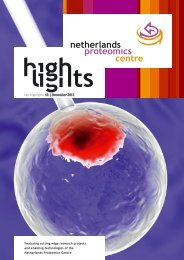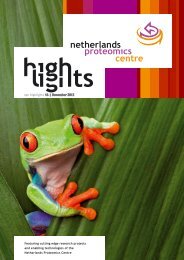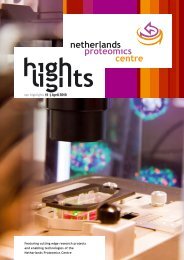NPC Progress Meeting 2012 - Netherlands Proteomics Centre
NPC Progress Meeting 2012 - Netherlands Proteomics Centre
NPC Progress Meeting 2012 - Netherlands Proteomics Centre
- No tags were found...
Create successful ePaper yourself
Turn your PDF publications into a flip-book with our unique Google optimized e-Paper software.
<strong>NPC</strong> <strong>Progress</strong> <strong>Meeting</strong> <strong>2012</strong>“Choosing a career”Utrecht researcher and co-organiser Serena Di Palma foundthe lectures very interesting and useful. “Today I realised thatthere are many more research groups with MS expertise inthe <strong>Netherlands</strong> than I thought.” She found Delft University’sMartijn Pinkse’s presentation gave a good example of researchin context. “He explained that the secretion of some frogs,the peptides of which he analyses, is also used in traditionalmedicine and for hunting in the Brazilian rain forest.” Serenaalso enjoyed Maarten Altelaar’s talk. “It was a good overviewof all the attempts and improvements achieved recently in theproteomics field and he showed how technology has advancedrapidly over the last few years. The analysis of the samesample using state-of-the-art techniques gives a much betterresult than using older apparatus.”Serena has developed several techniques for the analysis ofvery small sample sizes, just a few thousand stem cells. “Thetrick to making it possible is to miniaturise the system, forinstance employing nano LC columns. It is also important tominimise sample handling in order to avoid any loss duringthe preparation of the sample,” she explains. Upon finishingher thesis next year Serena will have to choose her career. “Intalking to my colleagues I found that many of us are strugglingwith the same question,” she says. “There are manyoptions. Do I start a business; do I choose a career in industryor in fundamental science at a university? Reinout Raijmakers’workshop was very useful in helping me understand that each“Learning new techniques”Despite his Dutch name, Georges Janssens is from California(US). He began his PhD study at Groningen eight months ago.A newcomer to the <strong>NPC</strong>, Georges is a geneticist working onyeast cells. He will be preparing old and young yeast cells inlarge enough quantities for proteomics analysis. Old yeastcells in particular are not abundant when grown as mostyeast cells in a population are young. From these cells theproteome will be analysed and compared to find clues onageing. Georges’ colleague Karin Wolters will be executingthe proteomics analyses, Multiple Reaction Monitoring inparticular (see her article on page 16 in this issue: ‘Targetedproteomics as a tool to study ageing in yeast’).Despite not being a proteomics specialist Georges is keen tounderstand the methods, hence his presence at the meeting.“Getting an overview of the different techniques availablehas been very useful; I can understand the big picture now.An overview such as Twan America gave of all the quantitativeMS analyses methods that are available was especiallySerena Di Palma, PhD student at Utrecht University<strong>NPC</strong> Project E1 ‘New separation and enrichment tools inproteomics’path can be successful, in so far as we strive to pursue ourambition and passion.” She would like to continue her scientificcareer starting with a postdoctoral experience outsidethe <strong>Netherlands</strong>. “Other groups have different expertise andapproaches. I think it is essential to change one’s overall viewto gain experience and increase skills and knowledge. In theend I might return to the <strong>Netherlands</strong>, but the future is alwaysdifficult to predict.”Georges Janssens, PhD student at the University of Groningen<strong>NPC</strong> Project T3 ‘Proteome biology of micro-organisms’useful,” he says. He also found an overview of bioinformaticsmethods interesting.| 25






